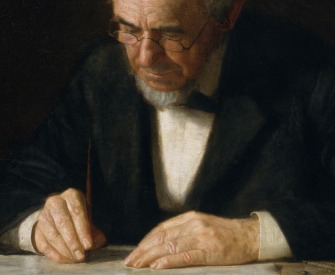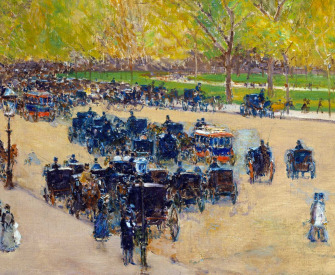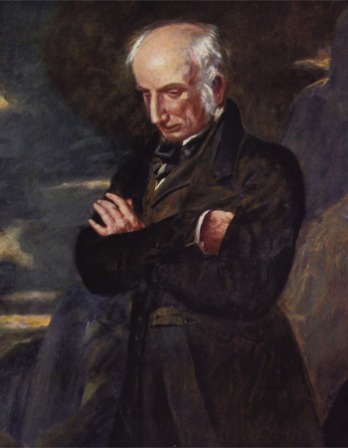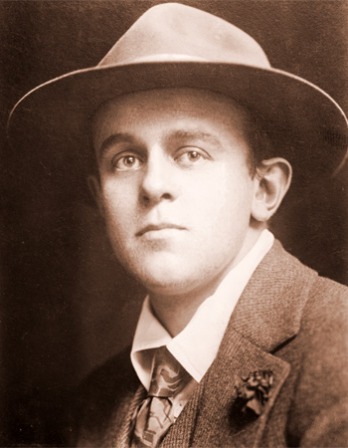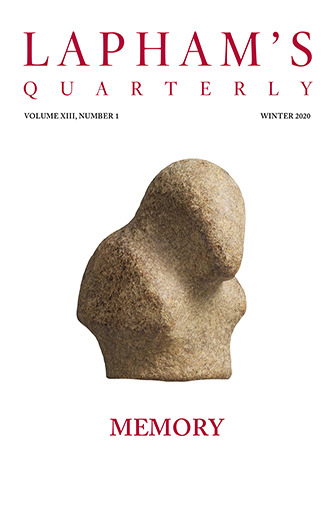The Tempter all impassioned thus began:
O sacred, wise, and wisdom-giving plant,
Mother of science, now I feel thy power
Within me clear not only to discern
Things in their causes but to trace the ways
Of highest agents deemed however wise!
Queen of this universe, do not believe
Those rigid threats of death! Ye shall not die.
How should ye? By the fruit? It gives you life
To knowledge. By the Threat’ner? Look on me!
Me who have touched and tasted yet both live
And life more perfect have attained than fate
Meant me by vent’ring higher than my lot.
Shall that be shut to man which to the beast
Is open? Or will God incense His ire
For such a petty trespass and not praise
Rather your dauntless virtue whom the pain
Of death denounced (whatever thing death be)
Deterred not from achieving what might lead
To happier life, knowledge of good and evil?
Of good, how just? Of evil (if what is evil
Be real) why not known since easier shunned?
God therefore cannot hurt ye and be just:
Not just, not God! Not feared then, nor obeyed.
Your fear itself of death removes the fear!
Why then was this forbid? Why but to awe,
Why but to keep ye low and ignorant,
His worshippers? He knows that in the day
Ye eat thereof your eyes, that seem so clear
Yet are but dim, shall perfectly be then
Opened and cleared and ye shall be as gods
Knowing both good and evil as they know.
That ye should be as gods since I as man,
Internal man, is but proportion meet:
I of brute human, ye of human gods.
So ye shall die perhaps by putting off
Human to put on gods: death to be wished,
Though threatened, which no worse than this can bring!
And what are gods that Man may not become
As they, participating godlike food?
The gods are first and that advantage use
On our belief that all from them proceeds.
I question it, for this fair earth I see
Warmed by the sun producing every kind,
Them nothing. If they all things, who enclosed
Knowledge of good and evil in this tree
That whoso eats thereof forthwith attains
Wisdom without their leave? And wherein lies
Th’ offense that man should thus attain to know?
What can your knowledge hurt Him or this tree
Impart against His will if all be His?
Or is it envy? And can envy dwell
In Heav’nly breasts? These, these and many more
Causes import your need of this fair fruit.
Goddess humane, reach then and freely taste!
He ended and his words replete with guile
Into her heart too easy entrance won.
Fixed on the fruit she gazed which to behold
Might tempt alone and in her ears the sound
Yet rung of his persuasive words impregned
With reason (to her seeming) and with truth.
Meanwhile the hour of noon drew on and waked
An eager appetite raised by the smell
So savory of that fruit which with desire
Inclinable now grown to touch or taste
Solicited her longing eye.
From Paradise Lost. Born in 1608, three years before the publication of the King James Bible, Milton grew up in a house on the same London street as the Mermaid Tavern, where Ben Jonson liked to drink. Milton contributed a poem, his first published verse, to the second folio of William Shakespeare, which appeared in 1632. He wrote “The Reason of Church Government” in 1642 and “Areopagitica” in 1644, became secretary for foreign tongues for the Commonwealth in 1649, and published Paradise Lost in 1667.
Back to Issue

